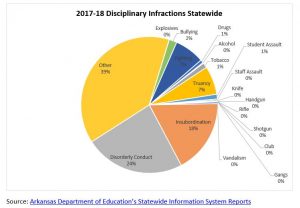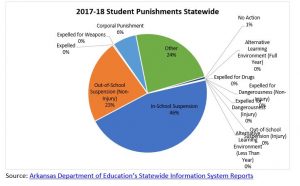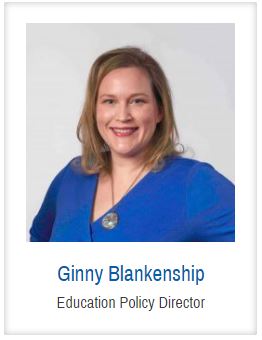
Nearly all students, teachers, and parents agree that schools must have an orderly, welcoming culture in order for students to feel safe and be able to learn. And teachers must feel supported by both administrators and parents when it comes to setting boundaries for student behavior and creating classroom environments that are conducive to learning. However, many outdated school discipline policies and practices are doing more harm than good. Harsh zero-tolerance policies often defy common sense, especially considering that only 10 percent of disciplinary infractions reported by schools are for fighting or bullying.
Source: Arkansas Department of Education’s Statewide Information System Reports
Why Discipline Matters
The body of research on ineffective, inequitable school discipline policies and practices has grown exponentially in recent years. Research shows that exclusionary practices, such as out-of-school suspensions, do nothing to improve student behavior and put students even further behind academically. Arkansas has some of the highest rates of exclusionary discipline practices in the nation. It is also one of the shrinking number of states which still allows public schools to use corporal punishment.
Exclusionary and zero-tolerance policies hurt students academically and emotionally; make them more likely to hate school and learning; and increase their likelihood of dropping out and entering the school-to-prison pipeline. Beyond the emotional cost to these students, exclusionary discipline practices are exacerbating chronic absenteeism in Arkansas, making it difficult for many students to read on grade-level, at a time when their brains are still developing and they may need extra support, especially students who have experienced traumatic events or have special physical, mental, or emotional needs. In 2017-18, a total of 54,206 out-of-school suspensions were given to students in Arkansas public schools.
Source: Arkansas Department of Education’s Statewide Information System Reports
Institutional Discrimination is Real
Arkansas’s school discipline practices also are among the most racially discriminatory. Research by Arkansas Advocates for Children and Families (AACF) and the Office for Education Policy (OEP) at the University of Arkansas has found that black students in Arkansas are punished far more harshly and more frequently for the same infractions as their non-black peers. In AACF’s research for the Legislative Task Force on the Best Practices for Special Education, AACF found similar disparities for students needing special education services in Arkansas and around the country.
Fortunately, there are many proven methods for improving students’ behavior and well-being that cost little to no money, while also supporting teachers in creating learning environments that work for all kids.
New Momentum to Reform School Discipline in Arkansas
The Arkansas Department of Education invited AACF to serve on its Task Force on School Discipline in 2016. After two years of meetings with school administrators, policymakers, and student advocates, the Task Force will release its final report in September 2018. AACF recommended that the Task Force adopt the following priorities in its report:
- Reduce the use of exclusionary discipline practices;
- Reduce disparities in disciplinary actions by race;
- Encourage schools to adopt policies to increase student engagement and keep students in the classroom;
- Provide training in the use of positive alternatives to suspensions and corporal punishment, such as restorative justice; and
- Make more data and resources available to parents and educators.
How to Create Healthy School Cultures and Help All Students Thrive
Based on research on school discipline in Arkansas and across the country, AACF recommends the following specific reforms:
- The state should take additional steps and allocate additional resources for the Arkansas Department of Education to fully meet its current obligations under Act 1329 of 2013 and Act 1015 of 2017 to provide discipline oversight and support to schools. Since Act 1329 was passed in 2013, reported disciplinary incidents have increased statewide. Many schools need much more training and support in implementing effective and equitable discipline, classroom management, student and family engagement, and mental health services.
- The Task Force should present its final recommendations, along with the state’s annual school discipline report, to the Arkansas Supreme Court Commission on Children, Youth and Families and the House and Senate Education Committees. The Joint Committee on Educational Adequacy also should consider including the state’s annual report on school discipline in its biennial study of whether Arkansas is providing an equitable and adequate education to all public school students under the state Constitution.
- Research shows that corporal punishment, or spanking, is ineffective in improving student behavior and school climate, causes long-term emotional damage to children through adulthood, and is generally administered disproportionately to students of color. The state should ban corporal punishment in all schools that receive public funds. Arkansas is one of only 19 states which still allow this inhumane and antiquated practice. The Office for Education Policy found that 80 percent of school districts reported hitting students at least once in 2015-16. The Arkansas Department of Education’s data shows that students were hit a total of 15,453 times in schools across Arkansas in 2017-18.
- The Arkansas Department of Education and education service cooperatives should work together to provide additional professional development to educators on positive discipline, restorative justice, classroom management, and school culture.
- Positive discipline means helping children understand how to make good choices. Multiple experimental studies have found that Positive Behavioral Interventions and Supports (PBIS), a school-wide approach to addressing the root causes of behavioral and academic problems early, decreases school suspensions and improves student perceptions of school culture and safety.
- Restorative justice allows students to take responsibility for their actions, learn to regulate their emotions, and repair relationships they may have harmed. Research suggests that this approach improves students’ behavior, attendance, academic outcomes, graduation rates, and the school climate for all students.
- The Task Force on School Discipline should coordinate with the State Board of Education’s Task Force on Family Engagement to help the Arkansas Department of Education and other stakeholders provide parent-friendly resources about effective discipline practices and how families can help their children thrive at school (e.g., one-pagers, infographics, parent workshops).
- AACF and the Arkansas Out-of-School Network have advocated for many years for investment in quality afterschool and summer programs, which research has proven to keep kids safe, out of trouble, and engaged in learning outside of the regular school day. The state should invest in these programs through the Positive Youth Development Act (PYD). This bipartisan legislation was passed in 2009 to help local communities create or scale-up these programs; however, the program has yet to be funded. As AACF recommended in our recent report on National School Lunch (NSL) funding, schools also should use their state funding for low-income students, known as NSL, to provide or partner with community organizations in offering mentoring, tutoring, and enrichment for kids who have behavioral, academic, and social-emotional challenges and need extra one-on-one attention. The Task Force on School Discipline heard testimony from many great programs across the state that are doing this well and could provide a model for other programs.
- The student-counselor ratio in the state’s school funding matrix is insufficient to meet the needs of academic, behavioral, and mental health needs of students. The American School Counselor Association recommends a ratio of one counselor for every 250 students. The current matrix provides funding for 1.11 counselors for every 500 students. The legislature should provide additional funding for schools to provide more school counselors, social workers, or coordinated school health (including mental health services) to help disengaged or at-risk students, who may have behavior problems.
- The Arkansas Department of Education and the Arkansas Department of Higher Education should work together to encourage teacher certification programs and higher education institutions to provide more training and support in positive school discipline, classroom management, and school culture for prospective teachers.
- Schools should be required to report the reading levels of students who are suspended or expelled and provide dyslexia screenings and necessary reading interventions for students who are suspended at least once per school year.
- Act 1059 of 2017 prohibits out-of-school suspensions or expulsions for students in kindergarten through fifth grade except for a student who “(a) Poses a physical risk to himself or herself or to others; or (b) Causes a serious disruption that cannot be addressed through other means.” The Department of Education has not created rules to define what “physical risk” or “serious disruption” mean. Earlier this year the Department said that it intended to update its 2012 rules soon, which should incorporate those definitions. For more information, see AACF’s recent policy brief, “How School Discipline Policies Affect Chronic Absenteeism” (2018). After more is known about the benefits and challenges of implementing this law in K-5, and more schools provide training in effective alternatives to suspensions and expulsions, the state should study the benefits and challenges of expanding this law to apply to students in grades 6-8.
- The state should create new rules to prevent or limit school waivers for some state policies on school discipline (see § 6-18-501 et seq. in Arkansas statute), which all school districts may apply to receive under Act 1240 of 2017. For example, § 6-18-502 requires school districts to involve parents, students, and teachers in developing its school discipline policy; provide the written policies to all parents and students; and to provide teachers, administrators, and volunteers with “appropriate student discipline training.” § 6-18-503 and 6-18-505 define how corporal punishment may be used by teachers or administrators. Other statutes in this section of code include guidelines for school suspensions and expulsions, parental notification of student misconduct, anti-bullying policies.
- As AACF recommended last year, the Arkansas Department of Education should incorporate school discipline as a school climate measure in the new federal Every Student Succeeds Act (ESSA) beginning in 2019-20.
- The Arkansas Department of Education has done a great job of reporting discipline data on its website. It now should disaggregate and publish additional data in school report cards on suspensions, expulsions, corporal punishment, disaggregated by race and gender.
Conclusion
In summary, there are many low- and no-cost things the state and school districts can do to improve discipline policies and practices and keep more kids in the classroom, ready to learn. These policies can help keep kids safe, learn the social and emotional skills they need to succeed in school and the workforce, receive mental health support, and reach their full potential.
Students must have the freedom to make the right choices, the responsibility to accept the consequences, and the opportunity to grow and learn from their mistakes. Newer, research-based methods of discipline do not excuse poor decision-making or tolerate violent behavior but rather redirect behavior in a positive way, reinforce good decisions, and help students (and teachers) learn healthy ways of processing strong emotions. Without effectively addressing students’ social and emotional needs at an early age, our communities and workforce ultimately pay the price.
Stay tuned for the release of the state Task Force on School Discipline’s final recommendations, as well as a forthcoming report from AACF that will provide additional data and analysis about the need for school discipline reform in Arkansas.



